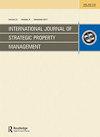Balanced Scorecard Model and Organization Performance in Rwanda
IF 1.7
4区 管理学
Q3 MANAGEMENT
International Journal of Strategic Property Management
Pub Date : 2023-11-14
DOI:10.53819/81018102t5288
引用次数: 0
Abstract
The purpose of this research was to examine the effect of the balanced scorecard model on organization performance in Rwanda, specifically focusing on a private institution of higher learning. The study assessed the impact of considering the financial perspective on the organization's performance, investigated the influence of the customer perspective on performance, explored the impact of the learning and growth perspective on performance, and determined the influence of internal process analysis on the organization's performance. Both descriptive and correlational research designs were used. The target population consisted of 150 employees, and 109 were selected randomly using basic random sampling methods. Inferential statistics, including correlation and regression analysis, were employed to determine the relationship between independent and dependent variables. Descriptive statistics, such as frequency, percentage, mean, and standard deviation, were used for variables and constructs. The results were presented in tables, and the research followed ethical guidelines throughout the study process. The correlation analysis revealed strong positive correlations between the financial perspective and organization performance (r = 0.770**, p = 0.000) and between the customer perspective and organization performance (r = 0.819**, p = 0.000). Learning and growth showed a moderate positive correlation (r = 0.617**, p = 0.000), and internal process analysis had a moderate positive correlation (r = 0.691**, p = 0.000). Since the p-values for all four variables were <0.01, the correlations were statistically significant, leading to the rejection of the null hypotheses. The findings from the regression analysis indicated that the R Square value was 0.693, with the adjusted R Square at 0.680 when organization performance was regressed against independent variables. In conclusion, the study found that an organization's performance is positively impacted by the implementation of a balanced scorecard model. The study recommends that organizations, particularly those in the private higher education sector in Rwanda, should consider adopting and implementing the balanced scorecard model as a strategic management tool. Organizational management should adopt sustainable customer relationship strategies to improve their perception. The study also recommends continuous internal processes analysis such as customer complain analysis, timely customer feedback consideration and compliance to regulatory bodies to improve the decision-making processes. Keywords: Financial perspective, Customer perspective, Learning and growth perspective, Internal processes perspective and Performance平衡计分卡模式与卢旺达的组织绩效
本研究的目的是检验平衡计分卡模型对卢旺达组织绩效的影响,特别关注一所私立高等教育机构。本研究评估了考虑财务视角对组织绩效的影响,调查了顾客视角对绩效的影响,探讨了学习和成长视角对绩效的影响,确定了内部过程分析对组织绩效的影响。描述性和相关性研究设计均被采用。目标人群为150名员工,其中109人采用基本随机抽样方法随机抽取。推论统计包括相关分析和回归分析来确定自变量和因变量之间的关系。描述性统计,如频率、百分比、平均值和标准差,用于变量和结构。结果以表格形式呈现,整个研究过程都遵循了伦理准则。相关分析显示,财务视角与组织绩效之间存在显著正相关(r = 0.770**, p = 0.000),客户视角与组织绩效之间存在显著正相关(r = 0.819**, p = 0.000)。学习与成长呈中等正相关(r = 0.617**, p = 0.000),内部过程分析呈中等正相关(r = 0.691**, p = 0.000)。由于所有四个变量的p值均为<0.01,因此相关性在统计上显著,导致拒绝原假设。回归分析结果表明,组织绩效对自变量进行回归时,R平方值为0.693,调整后的R平方值为0.680。综上所述,本研究发现平衡计分卡模型的实施对组织的绩效有积极的影响。研究报告建议各组织,特别是卢旺达私立高等教育部门的组织,应考虑采用和执行平衡计分卡模式,作为战略管理工具。组织管理应采用可持续的客户关系策略,以提高他们的感知。该研究还建议持续的内部流程分析,如客户投诉分析,及时的客户反馈考虑和遵守监管机构,以改善决策过程。关键词:财务视角、客户视角、学习与成长视角、内部流程视角和绩效
本文章由计算机程序翻译,如有差异,请以英文原文为准。
求助全文
约1分钟内获得全文
求助全文
来源期刊
CiteScore
4.00
自引率
18.50%
发文量
23
审稿时长
15 weeks
期刊介绍:
International Journal of Strategic Property Management is a peer-reviewed, interdisciplinary journal which publishes original research papers. The journal provides a forum for discussion and debate relating to all areas of strategic property management. Topics include, but are not limited to, the following: asset management, facilities management, property policy, budgeting and financial controls, enhancing residential property value, marketing and leasing, risk management, real estate valuation and investment, innovations in residential management, housing finance, sustainability and housing development, applications, etc.

 求助内容:
求助内容: 应助结果提醒方式:
应助结果提醒方式:


